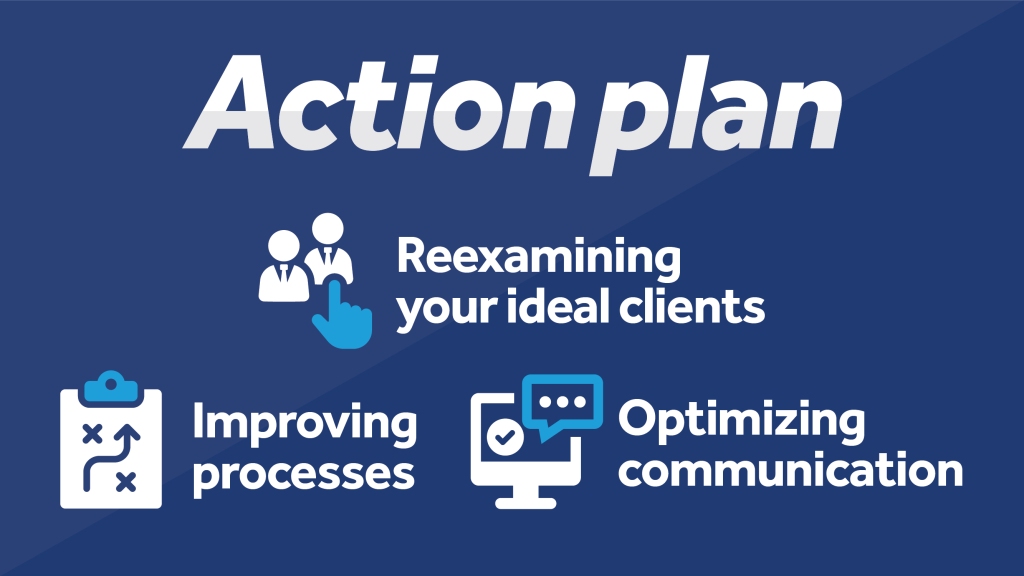The 2024 tax season deadline has come and gone (for most…some of you may still have extension seasons to contend with). But before you slam the door on busy season and move on to your recurring services—don’t.
Now is the best time to examine tax season. (Yes, I’m serious.) That means gathering your team and determining what went well, what didn’t go as well and what things were OK. If you wait until next year, chances are you won’t remember the not-so-great stuff…and then you’ll experience those same pain points in the 2025 tax season.
We suggest you review these three areas right after tax season:
- Your client list
- Your firm’s workflow processes
- Your internal and external communication
What’s the best way to review these areas? With a tax season debrief. So, let’s get started.
Gather feedback from staff
To make the 2025 tax season rock, conduct a debrief meeting of the 2024 season with your team. But first, you need to hand out scorecards or surveys to each staff member to gather their honest feedback. (Rightworks Academy members: Check out our process scorecard resource.)
Have each staff member evaluate their roles and processes from this tax season. Did bottlenecks occur? Was your team overwhelmed with too many documents to scan? Also, have them note things that worked well (i.e., processes that ran smoothly or tasks that were completed ahead of time).

To create your own scorecard, here are a few things to consider including for each portion (e.g., scanning process, tax preparation, tax software, delivery, billing):
- Rating. Use a rating scale from one to five (one being abysmal and five being fantastic).
- Positive feedback. Allow space for staff to include a list of things that went well (i.e., your firm completed all tax returns on time).
- Ideas for improvement. Include a section for staff to list areas that can be improved upon (i.e., too many clients didn’t provide documentation on time).
If your firm is ahead of the game, you may have handed out these scorecards before the start of busy season. If so, your team should have been able to track the good and the bad all season long. But if your team didn’t get a chance to do this, just tuck that idea away for the 2025 tax season (or start with this year’s extension season).
Have your staff fill out the scorecards and send them back to firm leaders to prepare for the next step: the tax season debrief meeting.
Conduct a tax season debrief
The 2025 tax season will be just like your recent busy season…unless you make intentional changes within your firm. That’s where the tax season debrief meeting comes in. You may be wondering why a debrief is essential. Here are a few reasons:
- It’s a celebration that you’ve made it through busy season.
- It allows space for staff members to be candid about their experience this time around, including the good, the bad and the better.
- You’ll hear fresh ideas to make the 2025 tax season—or even extension season—better.
I get it. The April 15 deadline has passed, and the last thing you want to do is keep talking about tax season. But conducting this debrief meeting right after the filing deadline helps keep pain points top of mind. It also sets your firm up for success before the next busy season.
Use this meeting to celebrate your firm’s accomplishments and as an opportunity to brainstorm new ideas with help from team members who are actually in the tax season trenches. This will help your leadership team develop a game plan for changes to make so you can rock the 2025 tax season.
Make an action plan

If you want the 2025 tax season to be better than this year’s, you’ll want to take the feedback and ideas provided by your team and create an action plan that you implement starting, well…now. At the very least, your plan should include the following three items:
- Reexamining your ideal clients. Each tax season, you’ll find yourself wanting to reduce the number of not-so-ideal clients and increase the number of ideal clients. Maybe your business model has changed, or you’ve added additional advisory services. Either way, it’s time to make a change. Academy members can use our client transition spreadsheet to determine the non-ideal clients that could possibly become ideal by shifting them to productized services.
- Improving processes. Based on feedback from your team, chances are you’ll identify some bottlenecks within your existing processes. Maybe your firm was over its tax client capacity, you were understaffed or you reviewed tax returns that really didn’t need to be reviewed. Are there processes that could be automated? Most likely, yes. (Spoiler alert: Changing your tech is the last thing you should do; focus on better processes and workflows first.)
- Optimizing communication. No matter what changes you make, you must communicate them not only to your staff and clients but also to your referral sources. And you’ll need to reiterate changes as often as possible. Seriously. Shout it from the rooftops if you have to. And keep the lines of communication open—especially during tax season.
Our list of action items isn’t exhaustive, but they’re the ones you’ll want to consider within your plan. A failure to plan is a plan to—say it with me—have the same or worse experience during busy season in 2025. (You thought I was going to say, “fail,” didn’t you?)
Rock the 2025 tax season
Tax season doesn’t have to be miserable…heck, you could even learn to enjoy it. But it will never get better unless you listen to your team’s feedback and make intentional changes for the future.
If you don’t want a repeat of this year’s tax season, but you’re not sure where to start, contact the Academy—we can help.
